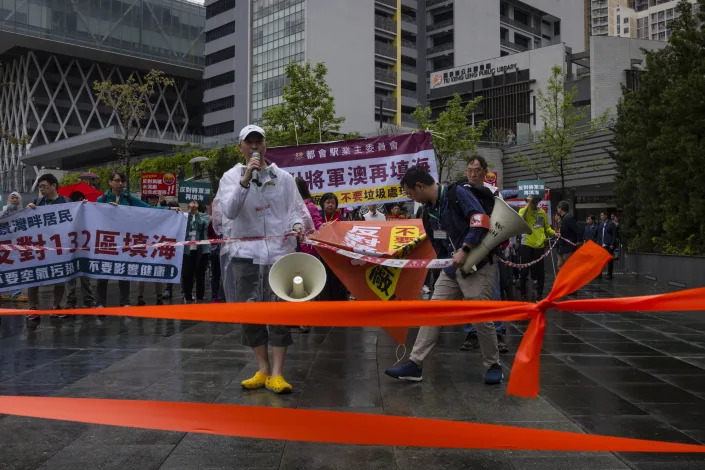
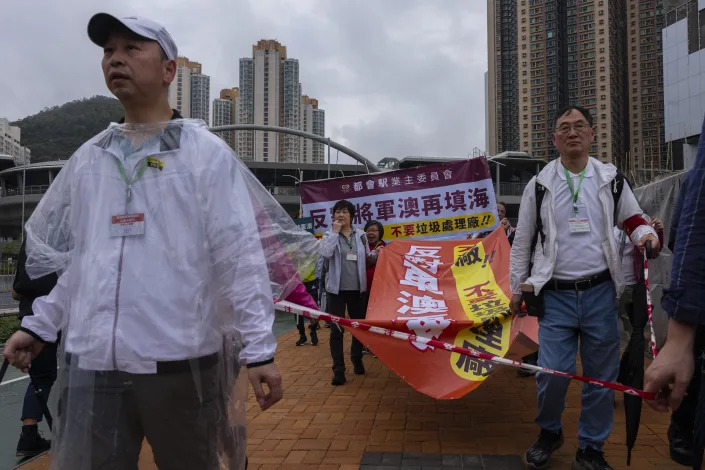
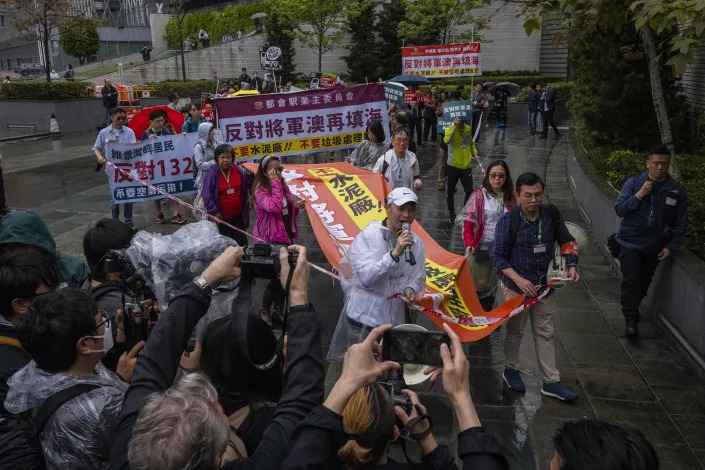
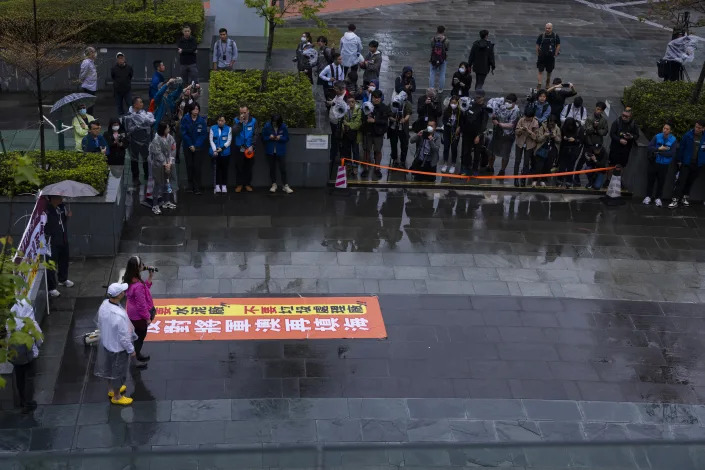
Protesters, left, stage a rally as member of the press, right, stand in a cordoned area in Hong Kong, Sunday, March 26, 2023. Dozens of people on Sunday joined Hong Kong's first authorized demonstration against the government since the lifting of major COVID-19 restrictions under unprecedentedly strict rules, including wearing a numbered badge around their necks.
(AP Photo/Louise Delmotte)
KANIS LEUNG
Sun, March 26, 2023
HONG KONG (AP) — Dozens of people on Sunday joined Hong Kong's first authorized protest since the lifting of major COVID-19 restrictions under unprecedentedly strict rules, including wearing a numbered badge around their necks.
The rules set out by the police, who cited security reasons, came as the financial hub was promoting its return to normalcy after years of anti-virus controls and political turmoil.
During the pandemic, protests were rare due to COVID-19 restrictions. In addition, many activists have been silenced or jailed after Beijing imposed a national security law following massive protests in 2019. Critics say the city's freedom of assembly that was promised Hong Kong when it returned to China from Britain in 1997 has been eroded.
Sunday’s demonstration against the proposed reclamation and construction of rubbish-processing facilities was the first police-approved march of its kind after the city scrapped its mask mandate and social distancing limits.
But organizers had to comply with police requirements such as taking measures to ensure the number of participants would not exceed the expected turnout of 100 people and asking for proof of a “reasonable excuse” from protesters who wore masks during the event. At the height of the 2019 anti-government movement, Hong Kong’s government invoked emergency powers to ban masks from public gatherings so it can identify protesters who officials accused of illegal acts.
On Sunday, about 80 people expressed their opposition to the plans in Tseung Kwan O, a residential and industrial area, the organizer said. They had to walk in a cordoned-off moving line in the rain amid heavy police presence.
Theresa Wang described the new restrictions as “a bit weird” but said they were still acceptable because the city was adjusting to “the new Hong Kong.”
“I’m not happy but we have to accept it. We have to accept what is deemed legal now,” the 70-year-old retiree said, adding that she hoped the protest would be a sign the government is more open to discussion.
Protester Jack Wong said he would prefer not to wear the badge printed with a number. Police said earlier the requirement aims to prevent lawbreakers from joining the march.
“But if it is a requirement, what can I say? I prefer not to comment further. You know what I mean,” he said.
In granting its approval, police also requested that organizers ensure there would not be any acts that might endanger national security, including displaying anything seditious.
Cyrus Chan, one of the march organizers, said demonstrators had communicated with police on their promotional materials and slogans. Officers earlier had told him that participants should not wear all-black outfits, he said. Protesters commonly wore black during the 2019 protests.
“It's definitely strict,” Chan said. “We hope this is just an individual case. We hope to show them that Hong Kong society has the ability to have peaceful marches and they do not need to set that many conditions to restrict us."
Earlier this month, the Hong Kong Women Workers’ Association planned a march to call for labor and women’s rights but canceled it at the last moment without specifying why.
Days later, the association said on its Facebook page that police had invited it for further meetings after granting it the approval and that it had tried its best to amend the agreement. But it still could not launch the protest as it had wished, it wrote at that time.
A pro-democracy group separately said national security police had warned four of its members not to participate in the association’s march.
_____
Associated Press photographer Louise Delmotte contributed to this report.
Hong Kong police keep tight tabs on first authorised protest in years
KANIS LEUNG
Sun, March 26, 2023
HONG KONG (AP) — Dozens of people on Sunday joined Hong Kong's first authorized protest since the lifting of major COVID-19 restrictions under unprecedentedly strict rules, including wearing a numbered badge around their necks.
The rules set out by the police, who cited security reasons, came as the financial hub was promoting its return to normalcy after years of anti-virus controls and political turmoil.
During the pandemic, protests were rare due to COVID-19 restrictions. In addition, many activists have been silenced or jailed after Beijing imposed a national security law following massive protests in 2019. Critics say the city's freedom of assembly that was promised Hong Kong when it returned to China from Britain in 1997 has been eroded.
Sunday’s demonstration against the proposed reclamation and construction of rubbish-processing facilities was the first police-approved march of its kind after the city scrapped its mask mandate and social distancing limits.
But organizers had to comply with police requirements such as taking measures to ensure the number of participants would not exceed the expected turnout of 100 people and asking for proof of a “reasonable excuse” from protesters who wore masks during the event. At the height of the 2019 anti-government movement, Hong Kong’s government invoked emergency powers to ban masks from public gatherings so it can identify protesters who officials accused of illegal acts.
On Sunday, about 80 people expressed their opposition to the plans in Tseung Kwan O, a residential and industrial area, the organizer said. They had to walk in a cordoned-off moving line in the rain amid heavy police presence.
Theresa Wang described the new restrictions as “a bit weird” but said they were still acceptable because the city was adjusting to “the new Hong Kong.”
“I’m not happy but we have to accept it. We have to accept what is deemed legal now,” the 70-year-old retiree said, adding that she hoped the protest would be a sign the government is more open to discussion.
Protester Jack Wong said he would prefer not to wear the badge printed with a number. Police said earlier the requirement aims to prevent lawbreakers from joining the march.
“But if it is a requirement, what can I say? I prefer not to comment further. You know what I mean,” he said.
In granting its approval, police also requested that organizers ensure there would not be any acts that might endanger national security, including displaying anything seditious.
Cyrus Chan, one of the march organizers, said demonstrators had communicated with police on their promotional materials and slogans. Officers earlier had told him that participants should not wear all-black outfits, he said. Protesters commonly wore black during the 2019 protests.
“It's definitely strict,” Chan said. “We hope this is just an individual case. We hope to show them that Hong Kong society has the ability to have peaceful marches and they do not need to set that many conditions to restrict us."
Earlier this month, the Hong Kong Women Workers’ Association planned a march to call for labor and women’s rights but canceled it at the last moment without specifying why.
Days later, the association said on its Facebook page that police had invited it for further meetings after granting it the approval and that it had tried its best to amend the agreement. But it still could not launch the protest as it had wished, it wrote at that time.
A pro-democracy group separately said national security police had warned four of its members not to participate in the association’s march.
_____
Associated Press photographer Louise Delmotte contributed to this report.
Hong Kong police keep tight tabs on first authorised protest in years
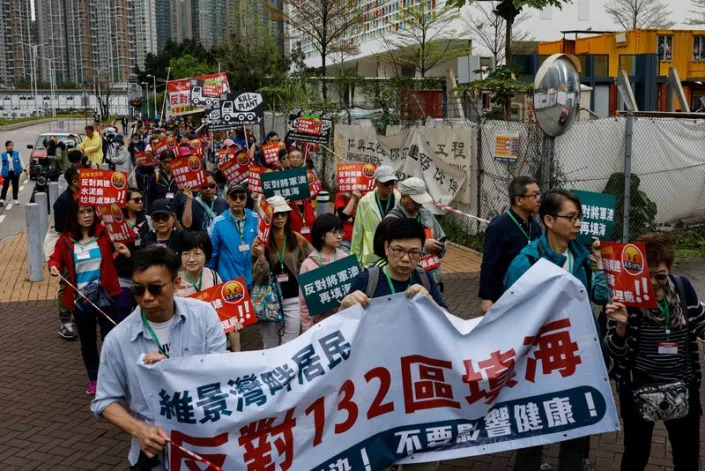
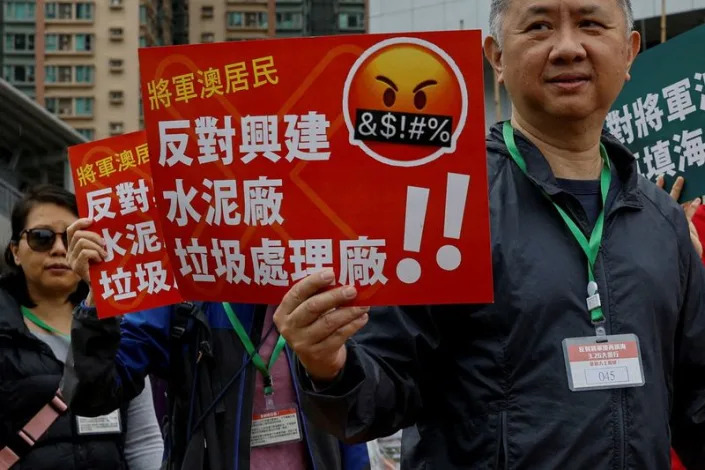
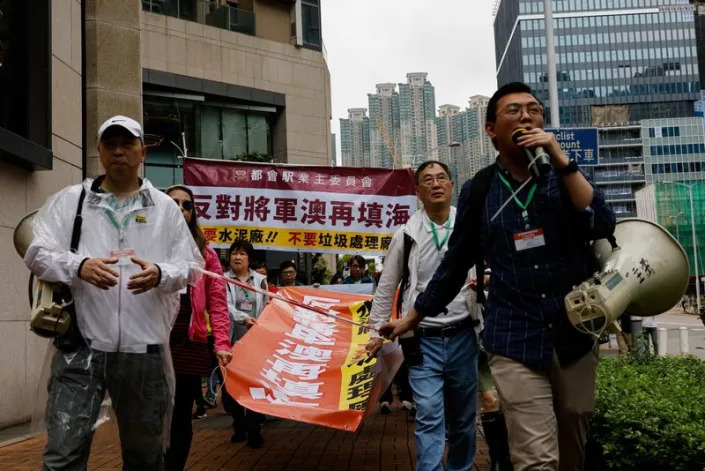
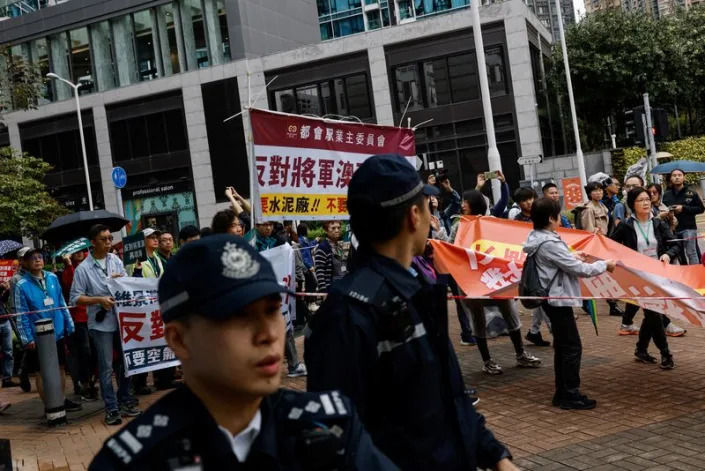
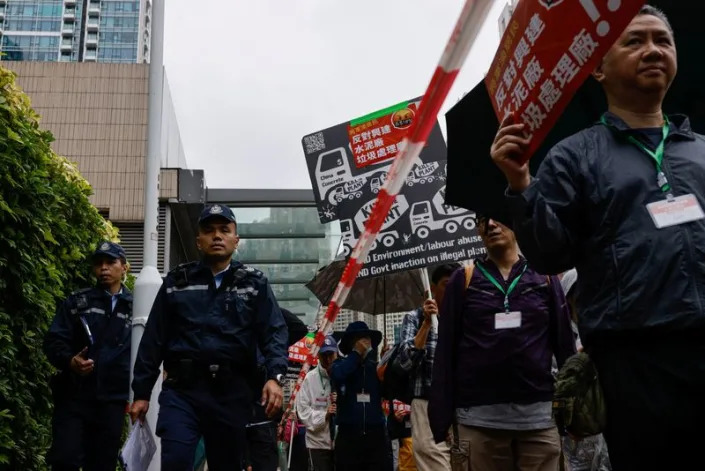
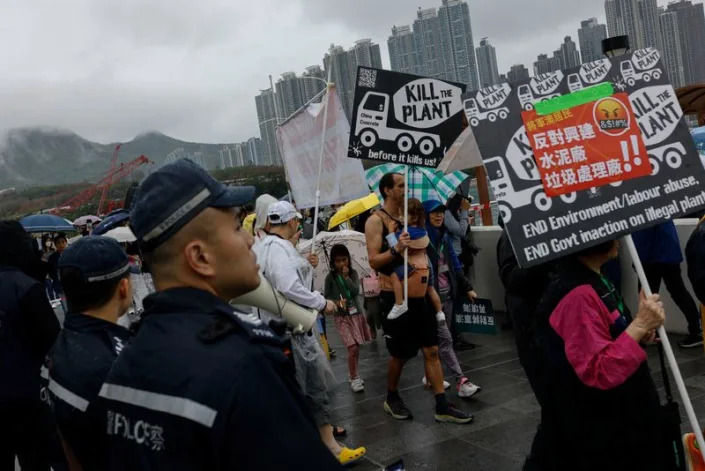
Protest against a land reclamation and waste transfer station project, in Hong Kong
Sat, March 25, 2023
By Jessie Pang
HONG KONG (Reuters) -Hong Kong police on Sunday permitted a small protest march under tight restrictions in one of the first demonstrations to be approved since the enactment of a sweeping national security law in 2020.
Several dozen demonstrators were required to wear numbered lanyards and were barred from wearing masks, as police monitored their march against a proposed land reclamation and rubbish processing project.
Participants chanted slogans against the reclamation project as they marched in the rain with banners in the eastern district of Tseung Kwan O, where the project is slated to be built.
Some also criticised the restrictions on their protest, which included a maximum of 100 participants, according to a seven-page letter from police to organisers, seen by Reuters.
"We need to have a more free-spirited protest culture," said James Ockenden, 49, who was marching with his three children.
"But this is all pre-arranged and numbered and it just destroys the culture and will put people off from coming for sure."
Responding to the protest, the city's Development Bureau said the project was intended to "support the daily needs of the community".
It said it would "respect the right to freedom of expression" and would study the possibility reducing the scale of the land reclamation.
Police granted the organisers a "no objection" letter on condition they ensured the protest would not violate national security laws, including seditious displays or speech.
"Some lawbreakers may mix into the public meeting and procession to disrupt public order or even engage in illegal violence," the police warned in their letter.
Organisers said up to 50 people took part in the first protest to be authorised by the city's police for several years. They later told media that around 80 people joined Sunday's protest.
Applications for other protests, including a candlelight vigil on June 4 to commemorate the victims of China's Tiananmen Square crackdown in 1989, have been denied on grounds related to COVID social-distancing.
The last of Hong Kong's COVID restrictions was scrapped this year, following China's decision to end its "zero-COVID" policies.
Hong Kong's mini-constitution, the Basic Law, guarantees the right to public assembly.
Since the China-imposed national security law, enacted in June 2020 in response to protracted pro-democracy protests in 2019, authorities have clamped down on freedoms and arrested scores of opposition politicians and activists.
Some Western governments have criticised the law as a tool of repression but Chinese authorities say it has restored stability to the financial hub.
One protester surnamed Chiu, 50, said she appreciated the chance to protest "in difficult times", and said she saw the lanyards more as a means to facilitate crowd management.
"It doesn't mean putting a leash on us to restrict our expression. I think it's acceptable," she told Reuters.
Political observers and some Western diplomats are watching to see if authorities will allow a resumption of major demonstrations in Hong Kong, namely on June 4 and July 1, that had been a mainstay of the city's once vibrant civil society scene and attracted thousands of people.
(Additional reporting by Xie Yu, Writing by James Pomfret; Editing by Robert Birsel and Louise Heavens)
Police monitor first Hong Kong protest since 2020
BBC
Sun, March 26, 2023

Police gave permission for 100 people to attend the rally.
The first protest in two years has taken place in Hong Kong under close monitoring by police.
The small rally was the first since China imposed sweeping restrictions on the rights and freedoms of people living in the territory.
Only 100 people were allowed to attend. They were also required to wear number tags and their banners were examined in advance.
Sunday's march was against a land reclamation plan in the city's east.
Police required organisers to follow stringent conditions and surrounded the marchers with a cordon that kept media and protesters separated.
The participants were allowed to chant slogans against the project.
An anonymous attendee told AFP that the arrangements were "ridiculous": "I am here to join a march, not a shame parade," he said.
Another commented that the measures under which they were allowed to hold the march amounted to "intimidation".
Hong Kong is a Special Administrative Region of China. Under its "one country, two systems" principle, residents are supposed to enjoy certain freedoms unavailable on the mainland - and Hong Kong's mini-constitution, the Basic Law, guarantees the right to public assembly.
But these rights have been eroded since 2020, when Beijing imposed a national security law in response to the months-long Hong Kong protests against Beijing's control in 2019.
Beijing said the law was needed to bring stability to the city - but critics said it was designed to squash dissent, and weaken Hong Kong's autonomy.

Protesters had to wear numbered lanyards to the march.
BBC
Sun, March 26, 2023

Police gave permission for 100 people to attend the rally.
The first protest in two years has taken place in Hong Kong under close monitoring by police.
The small rally was the first since China imposed sweeping restrictions on the rights and freedoms of people living in the territory.
Only 100 people were allowed to attend. They were also required to wear number tags and their banners were examined in advance.
Sunday's march was against a land reclamation plan in the city's east.
Police required organisers to follow stringent conditions and surrounded the marchers with a cordon that kept media and protesters separated.
The participants were allowed to chant slogans against the project.
An anonymous attendee told AFP that the arrangements were "ridiculous": "I am here to join a march, not a shame parade," he said.
Another commented that the measures under which they were allowed to hold the march amounted to "intimidation".
Hong Kong is a Special Administrative Region of China. Under its "one country, two systems" principle, residents are supposed to enjoy certain freedoms unavailable on the mainland - and Hong Kong's mini-constitution, the Basic Law, guarantees the right to public assembly.
But these rights have been eroded since 2020, when Beijing imposed a national security law in response to the months-long Hong Kong protests against Beijing's control in 2019.
Beijing said the law was needed to bring stability to the city - but critics said it was designed to squash dissent, and weaken Hong Kong's autonomy.

Protesters had to wear numbered lanyards to the march.
No comments:
Post a Comment